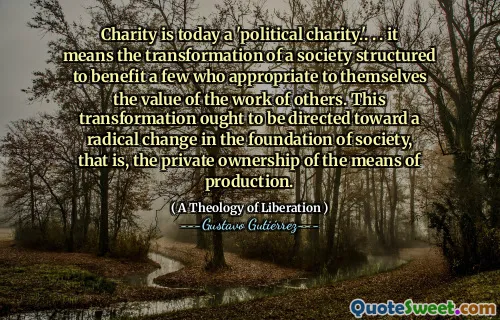"A Theology of Liberation" by Gustavo Gutiérrez is a foundational text in liberation theology, which emphasizes social justice and the liberation of oppressed peoples. Written in the context of Latin America, Gutiérrez combines Christian faith with the experience of poverty and oppression, arguing that the Church has a moral obligation to address the systemic injustices that affect the marginalized. He critiques traditional theological perspectives for often overlooking the plight of the poor and emphasizes that theology must be rooted in the realities of human suffering.
The book outlines the importance of understanding salvation not only as a spiritual concept but also as a call to action against social injustices. Gutiérrez articulates how faith should inspire individuals and communities to work towards the liberation of the oppressed, emphasizing that this is a vital aspect of the Christian mission. He advocates for a theology that embraces a preferential option for the poor, calling for a radical reevaluation of societal values and power structures.
Gutiérrez's work has had a profound impact on 20th-century theology and social movements, resonating beyond Latin America. It encourages readers to engage critically with faith and to become active participants in the struggle for justice. As such, "A Theology of Liberation" not only presents theological insights but also serves as a passionate call for collective action in pursuit of a more equitable world.
More »
Today Birthdays
1729 -
Edmund Burke
1949 -
Haruki Murakami
1954 -
Howard Stern
1876 -
Jack London
1993 -
Zayn Malik
1951 -
Kirstie Alley
1863 -
Swami Vivekananda
1923 -
Alice Miller
1987 -
Naya Rivera
1825 -
Brooke Foss Westcott
1944 -
Joe Frazier
1951 -
Rush Limbaugh
1964 -
Jeff Bezos
1978 -
Jeremy Camp
1628 -
Charles Perrault
1856 -
John Singer Sargent
1970 -
Kaja Foglio
1953 -
Rick Santelli
1986 -
Gemma Arterton
1968 -
Raf Simons
1958 -
Christiane Amanpour
1966 -
Olivier Martinez
1996 -
Ella Henderson
1917 -
Maharishi Mahesh Yogi
1949 -
Ottmar Hitzfeld
1928 -
Ruth Brown
1968 -
Heather Mills
1946 -
George Duke
1968 -
Rachael Harris
1923 -
Ira Hayes
